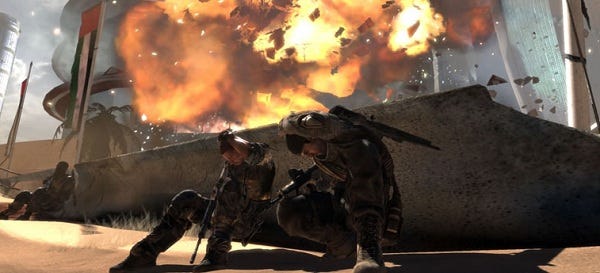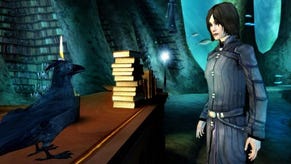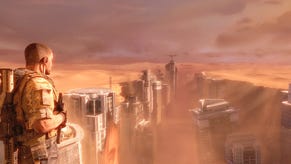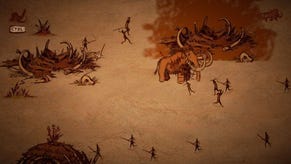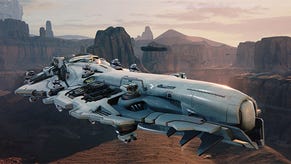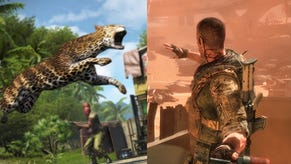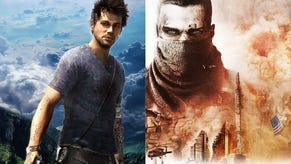Interview: Yager On Spec Ops: The Line
Talk The Line
Drawing inspiration from Joseph Conrad as much as the series that it seeks to reinvent, Spec Ops: The Line is a brutal, plot-driven third person shooter. After playing a few chapters of the game, I sat down with senior designer Shawn Frison to talk about Dubai, war stories, and the tension between horror and entertainment.
RPS: The first thing I’d like to talk about is The Heart of Darkness influence, which immediately brings in Apocalypse Now, so there’s this idea of taking the novella and putting another twist on it. Along with that you have the Dubai setting. So did the idea of reinterpreting Heart of Darkness come first and then the idea of Dubai as the setting came along, or was it the other way around?
Frison: I’m not completely sure if the setting or the interpretation came first. The game started off very different. In the original version, Dubai hadn’t been brought to its knees by sandstorms, but there was always something missing with that initial design and as soon as someone came up with the sandstorm idea everyone jumped on board with it.
But I’m not sure which came first. We have kind of gone in our own direction with The Heart of Darkness story a little bit as well. It was obviously a heavy influence and originally it was going to be just like Apocalypse Now, taking the same story and moving it to a new medium, a new setting, a new culture, a new time period.
RPS: One of the things that comes through strongly is the idea of war not just as hell but as madness. People being driven to terrible things and a sense that the setting reflects that, almost a pathetic fallacy, except that’s not quite the right term. It’s certainly a way to make it stand out from the Call of Duties and Medal of Honors.
Frison: Yeah, they’re more gung-ho.
RPS: This seems to start as an attempt to do something heroic that becomes chaos. Despite the element of fantasy, that kind of seems like a more realistic interpretation of combat. And that’s there in the lethality of the weapons, the fact that firefights are more rapidly deadly. Is that a case of design backing up theme?
Frison: Yeah, that’s definitely true. You’ve actually said it better than I could.
RPS: Then I shall stop talking so much!
Frison: When someone first came up with this idea of the sandstorms, that was one of the reasons we liked it so much. We have this theme of people starting out trying to be good and there’s something pristine and good in them, but then it’s corrupted and subverted by this really messed up situation. We thought that was a really neat parallel, that we have the main characters going through this thing and then at the same time, this city, this beautiful amazing city, has also been destroyed by the situation.
RPS: In a previous interview that I read, a different designer pointed out that you weren’t trying to be a political game, that this isn’t about the fall of wealth or capitalism. So was Dubai picked purely for its visual spectacle or is there an element of taking the cultural phenomenon that is Dubai and using that to make a bigger impact, commenting on the impermanence of power and wealth?
Frison: It’s a bit of both. Definitely the biggest thing is that it’s an amazing game environment. You have all this beauty and amazing architecture, which gives you an incredible verticality. It allows you to set the game entirely in one place but with a great deal of variety of stuff that you can do with it, which is all really cool.
But the other half of that is that while we’re not trying to make any sort of political statement, we like the sort of hubris of Dubai and being able to take that down a peg was definitely part of it. But more than anything it’s the beauty and being able to destroy that.
RPS: I think it was Gears of War that had the booklet called ‘Ruined Beauty’ (EDIT: it’s ‘Destroyed Beauty’. I prefer my accidental title.). One of the things that I noticed that I don’t think has been particularly visible in any of the trailers I’ve seen is the graffiti, which kind of reminded me of Rage's found art. In Spec Ops it seems to be a subversion of the advertising and commercialism.
Frison: We wanted it to feel like a real location, a real city, and the graffiti is part of communicating something about the story and the different factions that are in Dubai, but a lot of it was just to say, “hey, this is what would happen after months and months of chaos”. There’s even a recurring graffiti character, I don’t know if you noticed, it’s really subtle, just something for people who might pick up on something like that. There’s a certain art style where there’s a graffiti artist who will draw, like in the TV station…
RPS: Yeah, that’s the one I remember best. The guy with a gun to his head on an advertising billboard.
Frison: yeah, exactly. There are pieces of that throughout the game. His graffiti also shows little pieces of what’s going on throughout the city, the things that have happened in this crazy place.
RPS: So it’s another method to tell backstory?
Frison: Yeah, it’s a way of adding more. It helps to make the place seem more real, because it tells you that there are characters living in the city that aren’t directly involved in the plot of the game, but also just the visual side of it is great. It also gives you a little piece of background, a different insight into things that are happening and a totally different perspective. It’s very different from the stuff that’s in your face.
RPS: After that art diversion, to move to the way that the game plays, it seems a very conscious design decision to make everything so lethal.
Frison: Yeah. Absolutely.
RPS: It’s somewhat unusual, particularly with cover-based shooters. Enemies seem to take 100 bullets. I’m thinking of the Uncharted games, where a man with a bigger gun somehow becomes more capable of soaking up bullets. Jumping through a few chapters of Spec Ops, people continued to die when I shot them even at the later stages. Is that an important central design concept?
Frison: Absolutely. Some of it was purely from the perspective of getting the guns to feel right. A weapon isn’t going to feel powerful, even if the game balances is exactly the same and just as difficult, if you have to pump ten bullets into a dude wearing a t-shirt. It feels wrong, things don’t feel as punchy as they should. It’s kind of a lucky circumstance that it also really helps to make the game world feel more serious, more grim. If we had more cartoony gameplay, it’s much harder to get across that sense of serious business, of real life in a terrible situation.
RPS: There’s been no specific talk of multiplayer modes has there?
Frison: No. We have multiplayer, some cool competitive modes that we’ll talk about at some point in the future.
RPS: It’s a very story-based game and it can be easy in these sorts of stories for the villain to be the main guy. When I think of Heart of Darkness, I remember Kurtz but I don’t remember the protagonist. Maybe I’m just ignorant though. But with a player actually controlling the protagonist here, how important is it to give that whole squad character? Did you always have those three guys in mind?
Frison: As far back as I remember, we always wanted this to be a personal journey. But I hadn’t really thought about it and now that I do, I’m pretty sure we always knew the three characters that we wanted. It never changed, which is really unusual now that I’m thinking about it. I think that’s honestly important with the kind of game we’re trying to make.
If we let the main characters in the game get buried beneath the personality of the villain, you would lose seeing their transformation. We wanted to focus on how they change in response to these situations so we needed to give a strong sense of who they were from the beginning.
RPS: The journey into hell only matters if you care about the person taking the journey?
Frison: Exactly.
RPS: If you have a villain who is lost then you really want him to be a sort of mirror to the protagonist as he becomes lost, I guess?
Frison: That’s exactly it. The whole squad need to matter because if we don’t see the change in them we don’t believe the change in Konrad.
RPS: I found that I didn’t use the squad commands very much at all, although the companions are competent when left to their own devices.
Frison: That was another of our intentions right from the beginning. We wanted a game where you can play either way and it becomes less true on the higher difficulty levels, but on the easier levels you can leave your guys alone and they’ll do their thing, they’re smart, they’re Delta Force operatives. They’ll get things done.
If you use the squad commands you might be a little more effective, with more control over what’s going on and there’s a bit of risk/reward in that; you might be able to take out a key guy a little faster or at a key moment, but it also puts your guys at risk because they’re less defensive and coming out of cover to get a bead on a guy they don’t have an angle on.
RPS: One thing that’s difficult about making a world so lethal is that your own squad don’t necessarily feel very vulnerable. I know they’re not going to die. At one point one of them was down but presumably they can’t die because they are important to the plot? How do you keep that sense of vulnerability?
Frison: The way it works is that if they die you just get a ‘game over’ screen.
RPS: Oh, they can die?
Frison: Yeah!
RPS: I didn’t see that because I’m great. Or more likely you had some sort of cheat mode activated because I’m terrible.
Frison: (laughs) The answer is basically that they are vulnerable, they can die, and another way around it is that it lets us make them more vulnerable because in a three man team there's two possibilities for backup. If one is hurt, the other can help him so you’re not constantly having to babysit them. It also creates emergent and tense situations, say for example when they both go down and there’s a timer ticking…
RPS: They bleed out?
Frison: Yeah, so you need to get to them quickly.
RPS: It’s one of the first games I remember playing for ages where there are real human opponents, on this planet, and you can blow their heads clean off in such a bloody fashion. It seems kind of old-fashioned in a way, these days it’s often just a red puff and then they fall over. What was the intention with that?
Frison: One of the challenges with a game like this is that while we want to tell a story, we also want decent core shooter gameplay. It’s always challenging to embed that story in the gameplay. So we looked for little opportunities for where we could do that. One of them was this; we wanted to show how horrific war can be. Part of that is the carnage on the battlefield. If you shoot someone in the head with a small calibre pistol, not a big deal…
RPS: It’s kind of a big deal.
Frison: Well, sure, they die! (laughs) But it’s not quite as horrific. If you blast them in the face with a shotgun, you’re taking their head off, or if you use a 50 caliber or something like that. So we have heads that you can take off. If explosions go off too close to someone, they completely vapourise. And then also we wanted the aftermath of the battle to be pretty horrific too, some of the people don’t die right away, they crawl around.
We even put in some incentive to go over and finish them off. I don’t know if you noticed that you can execute when close up? You get a little bit of extra ammo when you do that and they don’t drop their weapon until you finish them. We wanted to encourage people to put themselves in that slightly…evil is the wrong word…brutal way of dealing with the situation.
RPS: The majority of it doesn’t feel fetishized. I think it was Sniper Elite which has the kill cam on the bullets, showing organs perforated, and it feels like a weird kind of reward. Spec Ops feels more unpleasant. The enemies are always chattering to one another and then they get cut down and start screaming instead. Even though there is a reward, there’s also a feeling of…well, shit, that felt bad.
Frison: I think it’s a really fine line to go between. It’s something that we have really struggled a lot with while making the game. How do you show how messed up all of this is and then moving into gore porn or gun porn. I think there’s less risk of that 20 years ago because people hadn’t gotten so used to that, but it’s become such a huge part of gaming, that it’s fun to make somebody’s body explode. So it’s difficult to say, 'this is happening because this is what happens in war', rather than 'this is happening because it’s fucking awesome'.
RPS: But at the end of the day it’s a game about shooting people for fun so there is always a tension there. There are ways that you’re building into the game that show you how unpleasant it is.
Frison: Well, this is something that happens in the real world for soldiers as well. There was a video that came out a while ago with some guys in a helicopter and they gunned down some people. One of the things that became a big deal wasn’t just what happened, it was the way the soldiers were talking about it. When you talk to people who have been involved in situations like that they’ll tell you that soldiers don’t talk like that because they’re cold and monstrous, it’s because they have to make light of it or they go insane.
You can’t kill people and think of them as human beings who were getting a cup of coffee that day. To some extent, you have to think of it like a video game to some extent. They can’t always do that successfully and that’s when it starts taking its toll. That’s something that we try to do, particularly in the final scene that you saw.
There is a tension between the horror of war and a fun shooter and it’s hard to balance but the good news is that we can explot that a little. We have you joyfully bombing the hell out of people, which gives a sense of power, but then you have to go down and walk through the aftermath of what you actually did, so you get both sides. The fun side and then the regret of what you did. I think the fact that it felt fun makes the impact that much worse.
RPS: So you talked to guys in the military as research for the game?
Frison: Yeah. We had one guy in particular who was our advisor, a special forces guy who does state security stuff now. It was interesting because at one time I was at a barbeque with the guy, and he was a really cool guy, just huge, but we’re hanging out with him and it’s weird because you’re talking and then you just think, “this guy has killed people”. This isn’t messing around here. But it’s nice to have someone like him play the game and say that it’s not disrespectful and it’s not making light of the situation.
RPS: And did those talks also help you to get a feel for how the guns work?
Frison: Absolutely.
RPS: They’re all real, the guns, so even though the setting is unreal, with Dubai not actually having succumbed to these huge sandstorms, is the setting contemporary or is it near future?
Frison: We have talked about it and to all intents and purposes it’s now but technically it could be next year or the year after that. But in terms of technology, it’s real world technology.
RPS: When we first saw the trailer and posted it there was some confusion as to whether there’s an actual supernatural element. Whether it’s a game about insanity or corruption from an outside source, which is something people can discover for themselves. Does that slight element of confusion please you?
Frison: I have mixed feelings about it. On one hand, there are some people who may stay away because of confusion but it’s a good sign that people aren’t looking at it and saying, “ok, it’s another game where I’m an American soldier shooting dudes in the Middle East.” That’s something we really wanted to get away from. This isn’t the typical, go in, rah rah, kill a bunch of terrorists and go home victorious kind of game. So despite any confusion about supernatural content, the important message is that this is a game about facing some demons (laughs).
RPS: And maybe people just don’t know how literal those demons are sometimes! ‘Confused’ may have been the wrong word. Maybe ‘intrigued’? Partly that may come from the title, this being a reboot or reimagining. Was it always a Spec Ops game or did that come later?
Frison: How Yager got the contract was that 2K was looking to restart the franchise and they let studios pitch their take on it. So it was always a Spec Ops game but it was intended not to be connected to the previous games. It’s a reboot of the franchise.
RPS: And what elements of that franchise were important? Was it simply having a military squad shooter or was there more than that?
Frison: That pretty much sums it up. The most important thing was nailing that feel of being an elite squad of guys in a tough situation. But we wanted to bring our own slant to it.
RPS: And did you get to visit Dubai?
Frison: I didn’t. But some other guys from the studio did.
RPS: It’s another good reason to set a game there.
Frison: (laughs) Yeah, we actually had our art director and lead artist go out there and they almost got into a bit of trouble, these guys who obviously weren’t from there very conspicuously taking pictures of all these different famous landmarks. So they got a little talking to from the police at one point.
RPS: How accurate is the rendition? How many places are real?
Frison: There are some minor differences but a lot of what you see is inspired by real places. But there are things you see where we’re just capturing the feel of the place with something fictional that we had an idea about.
RPS: And in terms of the geography, it seems like the traditional voyage from the outskirts toward the centre of things, the river going through, but is the geography real or completely made up?
Frison: I’d say semi-real. The level select screen shows your location in the city on a map, with a marker showing your progress through each chapter. We have a pretty clear idea of your path but we don’t go down in any real detail.
RPS: There are dramatic moments when the entire environment shifts due to sandstorms. Presumably all the storms are scripted?
Frison: Yeah, that allows us to make it more impactful and to do bigger things. You can’t have an overpass crumble because of a random sandstorm!
RPS: The sand is obviously a huge part of the game. How much of the tech went into that? There’s something appealing about the bullets hitting glass in a buried building and having sand pouring through like water. It’s a bit like being back in Rapture. Was that always a challenge, to do sand well?
Frison: We went back and forth with how much influence the sand would have on the game environmentally. Originally it was going to be a bigger part of the game but it felt a little gimmicky and took away from some of the other things we wanted to deal with. So instead we make it a major part of the game, it’s a bigger part of most combat than people realise, with sand clouds thrown up by explosions blinding enemies. A lot of time for the FX artists went into making it look good.
RPS: There are a couple of moments when there are just silhouettes moving through the dust which seems a striking motif, with the whole thing shot through with that red, which, importantly, isn’t brown!
Frison: (laughs) We did spend a lot of time just making it look as unique as possible.
RPS: Finally, is there anything specific you can say about the PC release?
Frison: The one thing I can say is that we care about PC, we’re not releasing some crappy console port. We went into this from the beginning knowing that we would concentrate on all three platforms and their own strengths.
RPS: The verticality feels like it will work well with mouse aiming. It feels like console-based shooters often take place on a horizontal plane and part of me feels like that’s partly because of a perceived limitation of joypad aiming.
Frison: Yeah, there’s lots of precise aiming in the game. The only other thing I would mention is the systemic stuff with the squad, which we call the evolution system. They change with the story, but we have them change visually as they get roughed up, with wounds and torn up clothing, but their voices change as well even for the generic dialogue. So when you reload or throw a grenade or get shot, they’ll shout out “fire in the hole”, “reloading!” Even those things change as the story unfolds, based on their emotional state. They become more haggard and the things they say change, it’s not “kill the Tango behind the car”, it’s “kill that son of a bitch!”
RPS: It reminds me a little of Batman getting his cape torn and messed up. Your guys sweat too, don’t they, in that desert heat?
Frison: Yes, but we don’t have systemic sweat! (laughs)
RPS: You heard it here first! Thanks for your time.
